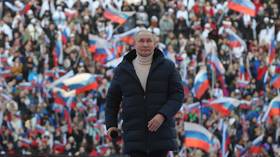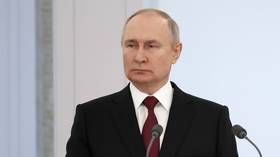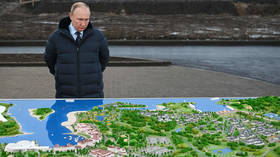Dmitry Trenin: Post-Soviet Russia is dead, but what will replace the West as the country's primary inspiration?
Entering a new period of turbulence in 2022, Russia will change beyond recognition, but we have yet to know precisely how

To describe in one word what 2022 has been for Russia? I would say – transformative.
This is nothing new. Wars invariably reconstruct the foundations of those who wage them. The ongoing conflict in Ukraine is not a minor operation. Even after only ten months, its impact appears to be far bigger than that of the Crimean War of the mid-19th century or the Russo-Japanese war of the beginning of the 20th. The closest analogy one can find in Russian history is the First World War, and not only due to the dominance of artillery and the reality of trench warfare.
This is the first conflict, for Russia, since the Soviet collapse, to require mass – though still limited – mobilization, and will surely be the biggest in terms of casualties sustained.
The war in Ukraine, however, is just a violent element in a wider “hybrid” conflict between Russia and the entire West. As such, it has featured the so-called ‘sanctions from hell’, and then many even more strident measures that few people imagined even a year ago. As a result, Russia is virtually completely locked out from the Western-dominated global financial system.
Meanwhile, trade with Western Europe, home to Moscow's traditional principal economic partners, has been severely curtailed; and the EU’s energy ties with Russia, the main material pillar of the relationship with the bloc, are quickly being demolished. Half of Russia’s currency reserves have been frozen, and the private assets of a number of the country's citizens have been confiscated.
On the political side, Russia has not just been forced to leave the Council of Europe; its foreign minister has even been barred from attending the OSCE annual meeting and was allowed to attend the UN General Assembly session only at the last moment. Roughly two-thirds of UN member states have condemned Russia’s action in Ukraine; the European Parliament has branded Russia a state sponsor of terrorism; and the German Bundestag has heaped on Moscow all the blame for the Soviet Famine in the early 1930s, the Ukrainian portion of which is now being called “genocide.”
German-Russian post-World War II reconciliation, one of history’s miracles – given that the two countries do not belong to the same military alliance or a common market, in their contemporary incarnations – is quickly eroding.
To cap it all, many in the West are working to bring about something like a moral execution of Russia, making it a latter-day version of post-1945 Germany. They are canceling Russian culture, barring Russian sportspeople from international competitions – including the World Soccer Cup and the Olympics – and even excluding Russian pets from dog and cat shows.
The magnitude and ferocity of those blows have been more than matched by the resilience displayed by Russia’s economy, society, and polity. The country’s GDP has contracted, but by less than 3% this year, with inflation at about 12% – which is lower than in many EU members states. The population has by and large managed to adapt to the new circumstances, including the totally unexpected mobilization shock.
With so many exports to Russia banned, the country is re-learning to manufacture products on a large scale by itself, from clothes to passenger airplanes. Technological sovereignty is ceasing to be a slogan and has turned into a policy. Financial sovereignty is being bolstered through a national payments system, and foreign trade in national currencies, including the ruble.
Western restrictions and the general hostility towards Russia have helped dispel residual illusions about Western Europe and North America, and have given a powerful boost to the long-overdue reorientation of Russian foreign trade policy to Asia, the Middle East, Africa, and Latin America. Russian elites, faced with a binary choice, have gone through a process of self-selection: Some have stayed with their country, while others moved closer to their assets abroad. Pro-Western groups inside Russia have lost most of their principal champions and adherents, many of whom have emigrated, while Russian patriotism has become stronger for many citizens. In terms of values and ideas, the culture of consumerism is being challenged by the culture of serving the common good.
Can it be that the worst of times could also the best of times, and that what we are witnessing in Russia is a creative destruction? It may be, but as 2023 begins, we are only at the very beginning of a process that promises to be as earth-shattering as the demise of the Soviet Union, but headed in the opposite direction. True, there is still too much uncertainty around. Bad things may yet crowd out the good ones. Part of the elite is still daydreaming about reconciling with the West, even at the price of a surrender, and the patience of ordinary people may yet snap in the face of new extraordinary hardships. However, turning the clock back to February 20, 2022, much less 2013, is simply impossible. It will not happen.
Russia is not an incrementalist nation. Historically, it moves ahead from one crisis to another, with periods of peace and quiet – and inevitably, decay – sandwiched between them. After the end of the war in Chechnya, Russia enjoyed two decades of peace, relative stability, and a measure of prosperity. Now, it is time to face up to a major new crisis – which has come just right after the first iteration of post-Soviet Russia had demonstrably exhausted its potential.
The contours of Russian Federation 2.0 are not yet clear. One can only hope for a more viable and more self-sustained economy; more independent and solid finances; a more capable technological and scientific base; a more equitable social contract; a political system more accountable to the citizenry; a meritocratic elite that serves the nation, rather than individuals; a military much stronger on the non-nuclear side; and a foreign policy that is closely engaged with the rising global majority of non-Western countries and – eventually – finding a satisfactory basis for new relations with Western Europe and North America.
This is a long wish list. One thing is clear though: The path to a better future for Russian will have to be created in Ukraine – undoubtedly at a high price.
https://www.rt.com/russia/568517-dmitry-trenin-rf-two-point-zero/



0 Comments:
Post a Comment
Subscribe to Post Comments [Atom]
<< Home